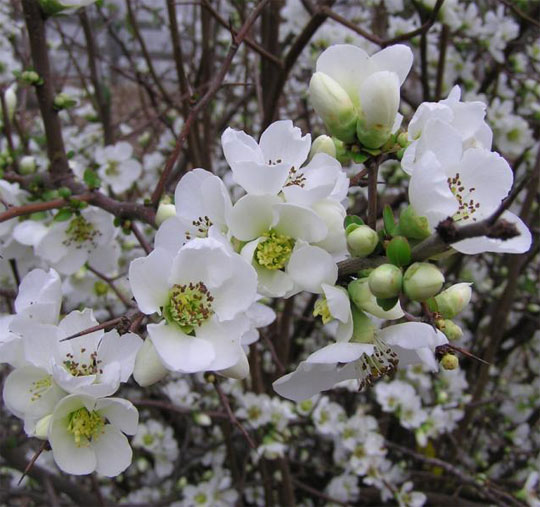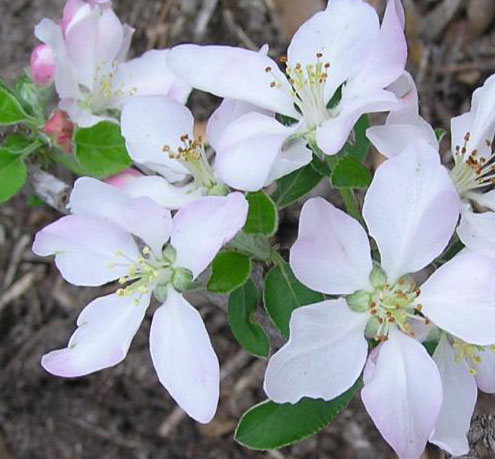Weekend Gardening: Early Flowering Trees Are Ushering In Spring
February 24, 2013
 Warmer temperatures have raised the spirits of gardeners in Northwest Florida. Although we know from experience that we still have a good chance of another cold snap or two, nicer weather is always a welcomed foray into spring.
Warmer temperatures have raised the spirits of gardeners in Northwest Florida. Although we know from experience that we still have a good chance of another cold snap or two, nicer weather is always a welcomed foray into spring.
Warmer weather also means that some trees and shrubs burst into bloom producing flowers that brighten otherwise drab winter landscapes. Several members of the rose family are currently in bloom in Northwest Florida and sure to grab your attention.
Flowering Quince
During Colonial times a quince tree was a rarity in the gardens of wealthy Americans, but was found in nearly every middle class garden. The fruit—always cooked—was an important source of pectin for food preservation, and a fragrant addition to jams, juices, pies, and candies. However, by the early twentieth century quince production declined as the value of apples and pears increased. Its popularity has plummeted and it is now a rarity in contemporary landscapes.
 Quince has been cultivated in the Middle East for centuries, and may have even been the fruit of temptation in the story of the Garden of Eden. The ancient Biblical name for quince translates as “Golden Apple.” In ancient Mesopotamia, now Iraq, cultivation of quince predates the cultivation of apples.
Quince has been cultivated in the Middle East for centuries, and may have even been the fruit of temptation in the story of the Garden of Eden. The ancient Biblical name for quince translates as “Golden Apple.” In ancient Mesopotamia, now Iraq, cultivation of quince predates the cultivation of apples.
This small, thorny, deciduous tree is one of the first to bloom in late winter. It is a member of the rose family and explodes with typical rose-type flowers in February each year. The single, white flowers are 1½ to 2 inches across and grow on current season growth.
The fruit is a fragrant, many-seeded pome about three inches in diameter. The fruit’s shape ranges from round to pear-like and the flesh is yellow. Several references refer to it as “hard and rather unpalatable.”
If you would rather not deal with the fruit, non-fruiting cultivars exist. Since most quince cultivars are not well-adapted to Florida because of their high chilling requirement, choose your cultivar carefully.
Apples
Another pome-type fruit that embellishes our landscapes in late winter is the apple tree. Along with the quince, it too is a member of the rose family. It is older in cultivation than the rose and is sometimes referred to as the prince of the rose family.
 Relatively few cultivars of apples (Malus domestica L.) can be grown successfully in Florida.
Relatively few cultivars of apples (Malus domestica L.) can be grown successfully in Florida.
Most apples have a high chilling requirement. Chilling requirement is defined as the number of hours less than or equal to 45 degrees F during the winter. Apple cultivars suitable for North Florida have a chilling requirement of less than 600 hours.
Only a few cultivars meet Florida’s low-chill requirement. Recommended cultivars include ‘Anna’, ‘Dorsett Golden’ and ‘TropicSweet’. ‘Anna’ and ‘Dorsett Golden’ originated in Israel and the Bahamas, respectively. ‘TropicSweet’ is a patented cultivar from the University of Florida. These cultivars each have a chilling requirement of 250 to 300 hours.
For more information on low-chill apples, review the University of Florida/IFAS online publication at http://edis.ifas.ufl.edu/mg368.
Flowering Cherry
While we may not be able to produce beautiful, delicious cherries in Northwest Florida, we can enjoy a few ornamental, flowering cherry trees.
One species that does well in Northwest Florida is Prunus campanulata or the Taiwan cherry. The Taiwan cherry grows to 20 to 25 feet and spreads nearly as wide as it matures. Single, drooping rose-type flowers appear in late winter and will last for about ten days.
 For other recommendations on flowering trees to add to your landscape, contact your local Extension Office.
For other recommendations on flowering trees to add to your landscape, contact your local Extension Office.
Theresa Friday is the Residential Horticulture Extension Agent for Santa Rosa County. The use of trade names, if used in this article, is solely for the purpose of providing specific information. It is not a guarantee, warranty, or endorsement of the product name(s) and does not signify that they are approved to the exclusion of others.
Theresa Friday is the Residential Horticulture Extension Agent for Santa Rosa County.



Comments